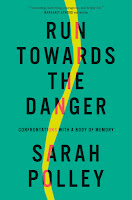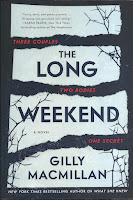Lars Kepler. Lazarus. Toronto: McClelland & Stewart/Random House Canada, 2020.
So I did it again ... masochist? This is the Kepler I missed before the most recent book called The Mirror Man (LL 276). If I had read this first, as it came in order, I would have willingly bypassed the The Mirror Man. A little Scandinavian Noir goes a long way, and this one tops the charts for gore and evil minds. Joona Linna, the protagonist detective, has lost his attraction for me. No one believes Joona that a former enemy has come back from the dead to destroy his targets mentally and emotionally rather than by killing them. Their nearest and dearest are made to suffer the grim consequences. And Joona is at the top of the villain’s list, meaning his daughter Lumi and girlfriend Valeria need immediate protection.
But this novel, while it features a fiend who appeared in previous books, is really detective Saga Bauer’s story. Joona takes some time out to hide with Lumi while Saga bears the brunt of Jurek Walter’s twisted plans. It takes time to realize that Walter also employs a brutal accomplice, to replace his twin brother killed by Joona, a monster who attracts attention by killing off criminals. Saga and her partner Nathan only have convoluted clues to find kidnapped family members and Walter’s hiding place. One can’t help but be caught up in the breathless pace; after all, “Kepler” is a master of language and plot structure. Can one adversary so ingenious, so strong, so deceptive, appear in so many places so quickly? Personally, I’m taking a break.
One-liners
▪ “He was never schizophrenic—the only thing that the diagnosis shows is how terrified the psychiatrist who conducted the evaluation was.” (32)
▪ I’m going to grind you into the dirt,” Jurek said quietly. (38)
▪ “Valeria, you need to take this seriously—come with me,” Joona begs, feeling more helpless than he has at any point in his life. (99)
▪ The detonator looks a lot like a ballpoint pen, with a small fuse and a pin at one end. (208)
▪ He remembers hearing about the effects when an anesthetic gas like halothane is combined with opioids or muscle relaxants and injected into the spinal column. (224)
▪ Saga sees the shot hit fairly high up on his torso; she’s almost certain that the jacketed bullet has passed right through his body. (320)
▪ “No one dies,” her mom cries. “He promised me that ....” (340)
Multi-liners
▪ But now he’s called her and asked if she remembers the solar eclipse in Helsinki. That means just one thing: that their disaster plan has been activated. (92)
▪ Maybe she could run away from him and grab the gun. She knows she would have no chance in close combat. (259)
▪ She has to find Jurek’s twin brother’s remains. She can’t tell anybody about the deal with Jurek. (264)
▪ “We’ve already used the Rapid Response Unit twice this week,” Carlos reminds him. “With nothing to show for it.” (386)
First business
The murders have nothing to do with cleansing society.
It’s a competition, a contest—they’re eliminating the losers.
“He’s alive,” Joona whispers, pushing his chair out from under the table.
Jurek Walter is alive. He’s been recruiting a new accomplice and testing candidates to see who would be the most suitable. He’s restricted his search to people with no moral boundaries.
Jurek needs someone to take his brother’s place, someone who’s utterly loyal, who’s prepared to accept punishment for the slightest mistake. (87)
Sarah Polley. Run Towards the Danger. Toronto: Hamish Hamilton/Penguin Canada, 2022.
No, I did not read every chapter of the memoir. Polley’s life as Canadian actor, director, activist, is of medium interest to me, her image fixed as Anne of Green Gables for many of us. But I have definitely admired the films she created in maturity. This book fast became a bestseller, perhaps due to her essay about encounters with the disgraced Jian Ghomeshi. Which of course I did read. One can’t help but be impressed with two distinct aspects: the overall clarity of written expression, and the extreme physical problems Polley faced. Reading of her trials with scoliosis, severe stage fright that led to a breakdown, the scary high-risk pregnancy, and consequences of a concussion were more than enough, and even then were not the entire book. Nonetheless, the sense of journey is evident and compelling, with humour sprinkled throughout that informs her identity. Sarah Polley is one very thoughtful, diligent, and creative woman. We have certainly not had her last word.
Random bits
▪ So it wasn’t an unhappy relationship with my dad, just a very complicated one, a very adult one, in a house that was falling apart with mice and moths infesting many rooms, and far too many conversations about the tragic pathos of pedophiles. (20)
▪ It is a learned art, this virtuoso caregiving, and she had taught it masterfully. (58)
▪ So many of us who have been sexually assaulted know that remembering the truth, knowing the truth, and telling the truth about it is anything but simple. (101)
Gilly Macmillan. The Long Weekend. USA: William Morrow/HarperCollins, 2002.
Four men, inseparable buddies since school days, now domesticated, still spend their weekend times together. Edie is the femme fatale that all four were once in love with, and she chose to wed Rob. Mark married Jayne; Toby married Ruth; Paul married Emily. Jayne, Ruth, and Emily are going to be deconstructed for us, so to speak, as the three spend the first night of a weekend together; their men surprised them at the last minute, by planning to not arrive until the following day. Edie is not with the women. Her husband Rob drowned not so long ago, leaving her ‘odd man out’; she and her daughter Imogen are still grieving husband and father. But Edie has sent a surprise to greet the others on their arrival at Deep Fell Barn, holiday lodgings owned by farmer John Elliott and wife Maggie. John has a deep attachment to his forefathers’ land, but sadly is well into dementia.
Edie’s note with her gift of champagne says one of their husbands will be dead before they return home. The vicious tone of the note sends all three into degrees of shock, disbelief, or hysteria. Emily wants to walk in the rainstorm down the steep muddy track to the distant farmhouse for cell phone reception; reaching Paul is all she can think of. Ruth gets drunk, worrying about her babysitter and a multitude of past incidents. Jayne dithers, trying to convince the others it’s a hoax. Each gets spooked by the storm, the surroundings, and self-introspection. What might be going on back home they don’t know about? Is anyone dead? Will the three men show up tomorrow? The intermittent narrative by a dangerous manipulator magnifies the tension. Opening the mysteries for us one by one, Macmillan keeps a mesmerizing pace in an ultra-twisting plot. Top marks.
The women
▪ Emily’s relative youth sometimes leaves Ruth at a loss for words. (9)
▪ But surely, it can’t be a coincidence that none of their husbands can be here with them this evening, even though the men are acting as though it is. (19)
▪ Did Toby lie about needing to see his sister tonight? Is he doing something else? (50)
▪ “Does she think we’ve done something to her? Is she blaming us for something, and this is her revenge?” (70)
▪ “Don’t let Edie get into your head.” (71)
▪ “You think I’m a gold-digger and he’s a cradle-snatcher? It’s not like that. I’m not after his money.” (90)
▪ There has never been a grand passion between Ruth and Toby. Friendship, yes. (91)
▪ This is what bonding means to Jayne: protection. Hard truths. Better to know everything than to be surprised. (91)
▪ The beautiful constancy of alcohol. It’s poetry to her. (93)
▪ It’s important to make an effort even under the circumstances. To keep the others calm. (102)
▪ Why has Jayne brought a gun here? Why does she even have a gun? (151)
Elsewhere
▪ There are the memory problems, bursts of emotional aggression, moments of confusion, lapses of judgment, repetitive conversations, and the obsessive thinking. He’s taken especially against having guests in Dark Fell Barn. (32)
▪ I tell you murder is easy by comparison to disposing of the body. (53)
▪ “I haven’t had much practice at being a parent.” (191)
▪ The worst thing is what he said: “Daddy’s here.” (222)
▪ Ruth was always an emotional accident waiting to happen. A perfectionist to the point of self-destruction. (277)
▪ Jayne’s an adult and a highly skilled one, at that, and adults should be responsible for themselves. (277)
▪ Everyone knows it’s not the hardest thing in the world to paint a woman as unstable. (277)



No comments:
Post a Comment